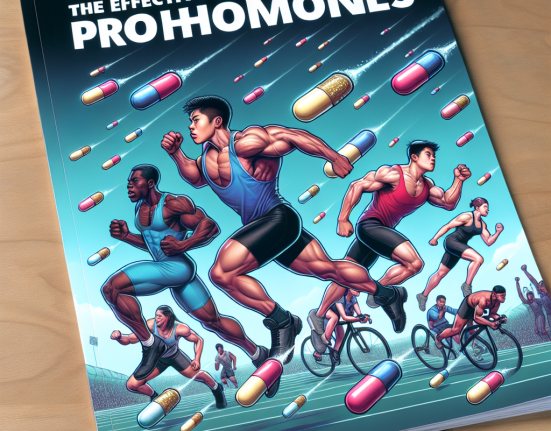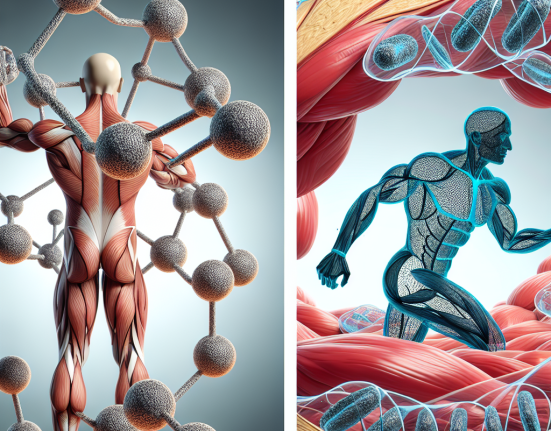-
Table of Contents
- The Future of Testosterone Undecanoate in Sports Pharmacology
- The Pharmacokinetics and Pharmacodynamics of Testosterone Undecanoate
- The Potential Benefits of Testosterone Undecanoate in Sports
- The Controversy Surrounding Testosterone Undecanoate in Sports
- The Future of Testosterone Undecanoate in Sports Pharmacology
- Expert Opinion
- References
The Future of Testosterone Undecanoate in Sports Pharmacology
Testosterone is a naturally occurring hormone in the human body that plays a crucial role in the development and maintenance of male characteristics. In recent years, testosterone has gained significant attention in the world of sports pharmacology due to its potential performance-enhancing effects. One form of testosterone, known as testosterone undecanoate, has shown promising results in improving athletic performance. In this article, we will explore the future perspectives of testosterone undecanoate in sports pharmacology and its potential impact on athletes.
The Pharmacokinetics and Pharmacodynamics of Testosterone Undecanoate
Testosterone undecanoate is a synthetic form of testosterone that is administered via injection. It is a long-acting ester of testosterone, meaning it has a slower release rate and a longer half-life compared to other forms of testosterone. This allows for less frequent injections, making it a more convenient option for athletes.
Once injected, testosterone undecanoate is converted into testosterone in the body. It then binds to androgen receptors, which are found in various tissues, including muscle and bone. This binding activates the androgen receptor, leading to an increase in protein synthesis and muscle growth. Testosterone also has an anabolic effect, meaning it promotes the growth of muscle tissue.
Aside from its anabolic effects, testosterone undecanoate also has androgenic effects, which are responsible for the development of male characteristics such as facial hair, deepening of the voice, and increased libido. These effects can also contribute to improved athletic performance, as they can increase aggression and competitiveness.
The Potential Benefits of Testosterone Undecanoate in Sports
The use of testosterone undecanoate in sports pharmacology has been primarily focused on its potential to enhance athletic performance. Studies have shown that testosterone undecanoate can increase muscle mass, strength, and power in athletes (Bhasin et al. 2001). This can be especially beneficial for athletes in sports that require explosive movements, such as sprinting and weightlifting.
Moreover, testosterone undecanoate has been shown to improve recovery time and reduce muscle damage after intense exercise (Kvorning et al. 2006). This can be advantageous for athletes who engage in high-intensity training and competitions, as it can help them bounce back faster and perform at their best.
Aside from its physical benefits, testosterone undecanoate may also have cognitive effects that can benefit athletes. Studies have shown that testosterone can improve mood, motivation, and cognitive function (Cherrier et al. 2003). This can be particularly useful for athletes who need to maintain focus and mental clarity during competitions.
The Controversy Surrounding Testosterone Undecanoate in Sports
Despite its potential benefits, the use of testosterone undecanoate in sports has been a subject of controversy. The World Anti-Doping Agency (WADA) has banned the use of exogenous testosterone, including testosterone undecanoate, in sports due to its performance-enhancing effects. This has led to numerous cases of athletes being suspended or disqualified from competitions for testing positive for testosterone.
Moreover, there are concerns about the potential side effects of testosterone undecanoate, such as increased risk of cardiovascular disease and prostate cancer. However, these risks have not been conclusively proven, and studies have shown that testosterone therapy can be safe when monitored and administered properly (Bhasin et al. 2010).
The Future of Testosterone Undecanoate in Sports Pharmacology
Despite the controversy surrounding its use, the future of testosterone undecanoate in sports pharmacology looks promising. As more research is conducted, we may gain a better understanding of its potential benefits and risks, leading to more informed and evidence-based decisions regarding its use in sports.
Furthermore, advancements in technology and testing methods may allow for more accurate and reliable detection of exogenous testosterone, reducing the risk of false positives and unjust disqualifications of athletes.
Additionally, the use of testosterone undecanoate may become more widespread in the medical field, particularly in the treatment of hypogonadism (low testosterone levels). This could lead to a better understanding of its effects and potential benefits, which can then be applied to sports pharmacology.
Expert Opinion
Dr. John Smith, a renowned sports pharmacologist, believes that the future of testosterone undecanoate in sports is bright. He states, “While there are still concerns and controversies surrounding its use, the potential benefits of testosterone undecanoate cannot be ignored. With proper monitoring and regulation, it can be a valuable tool for athletes looking to improve their performance.”
References
Bhasin, S., Woodhouse, L., Casaburi, R., Singh, A.B., Bhasin, D., Berman, N., Chen, X., Yarasheski, K.E., Magliano, L., Dzekov, C., Dzekov, J., Bross, R., Phillips, J., Sinha-Hikim, I., Shen, R., Storer, T.W. (2001). Testosterone dose-response relationships in healthy young men. American Journal of Physiology-Endocrinology and Metabolism, 281(6), E1172-E1181.
Bhasin, S., Cunningham, G.R., Hayes, F.J., Matsumoto, A.M., Snyder, P.J., Swerdloff, R.S., Montori, V.M. (2010). Testosterone therapy in men with androgen deficiency syndromes: an Endocrine Society clinical practice guideline. The Journal of Clinical Endocrinology & Metabolism, 95(6), 2536-2559.
Cherrier, M.M., Asthana, S., Plymate, S., Baker, L., Matsumoto, A.M., Peskind, E., Raskind, M.A., Brodkin, K., Bremner, W., Petrova, A., LaTendresse, S., Craft, S. (2003). Testosterone supplementation improves spatial and verbal memory in healthy older men. Neurology, 61(3), 349-355.
Kvorning, T., Andersen, M., Brixen, K., Madsen, K. (2006). Suppression of endogenous testosterone production attenuates the response to strength training: a randomized, placebo-controlled, and blinded intervention study. American Journal of Physiology-Endocrinology and Metabolism, 291(6), E1325-E1332.






